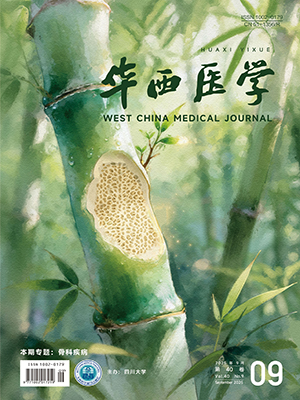| 1. |
孟庆革. 脑梗死合并糖尿病患者与非糖尿病脑梗死患者的血脂、血糖及预后临床分析[J]. 河北中医, 2010, 32(8):1268-1270.
|
| 2. |
相春霞. 非糖尿病患者脑梗死急性期应激性血糖升高及其对预后的影响[J]. 北京医学, 2008, 30(8):567-568.
|
| 3. |
陈光玲. 老年糖尿病患者合并重症脑梗塞的护理[J]. 哈尔滨医药, 2007, 27(4):80.
|
| 4. |
张国琴. 健康教育对脑梗死偏瘫患者康复的影响[J]. 浙江医学, 2011, 33(5):780-782.
|
| 5. |
徐蓉. 综合护理干预对脑卒中偏瘫患者康复的影响[J]. 中国全科医学, 2011, 14(29):3318-3319, 3324.
|
| 6. |
胡万保, 罗祖明, 商慧芳. 脑卒中4种评定量表的效度、信度及可操作性检验[J]. 中国临床康复, 2002, 6(19):2846-2847, 2867.
|
| 7. |
程若莺, 周郁秋, 孟丽娜, 等. 脑卒中患者生活质量量表研究进展[J]. 护理学杂志, 2010, 25(11):91-94.
|
| 8. |
吕秀英, 臧玉志, 张云霞. 血糖升高对急性脑血管病的危害分析及护理[J]. 护理研究, 2006, 20(17):1533-1534.
|
| 9. |
李丽君. 早期护理干预对糖尿病合并脑梗死患者血糖及运动功能的影响[J]. 中华现代护理杂志, 2010, 16(5):527-528.
|
| 10. |
马慧, 朱勇, 王卫华, 等. 急性脑梗死患者糖代谢水平与预后的关系[J]. 皖南医学院学报, 2012, 31(3):220-222.
|
| 11. |
李鸿雁. 护理干预对脑卒中偏瘫患者康复依从性及康复效果的影响[J]. 中国实用神经疾病杂志, 2010, 13(8):11-12.
|
| 12. |
何书萍, 杨玮. 不同护理模式对脑梗死患者的护理效果观察[J]. 齐齐哈尔医学院学报, 2012, 33(5):663-664.
|




